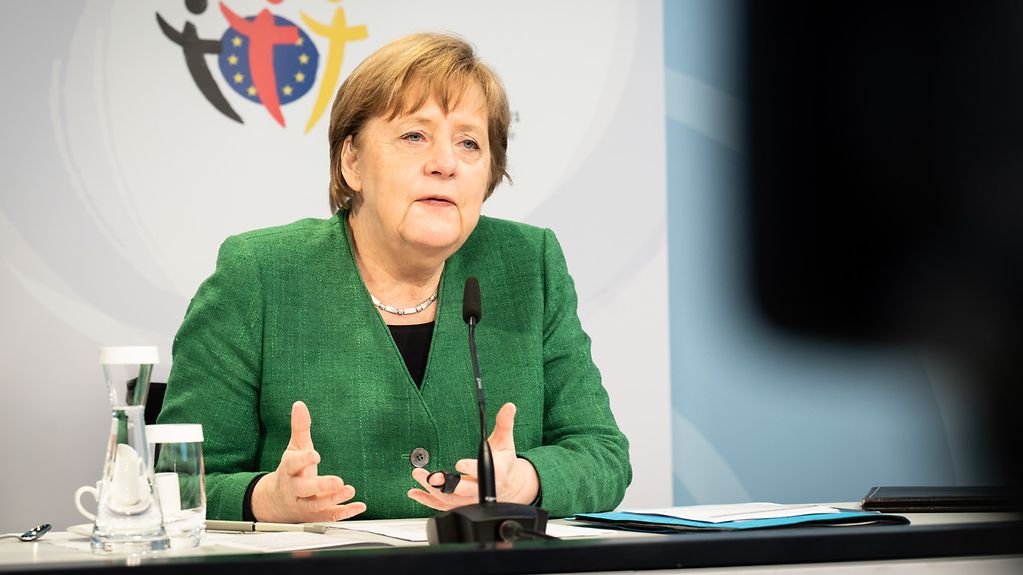Chancellor Angela Merkel speaks to the Council of Europe
Chancellor Angela Merkel has praised the role of the Council of Europe in strengthening human rights, democracy and the rule of law. Today, she said to the Council of Europe’s Parliamentary Assembly, Europe is the continent with the highest human rights standards. Germany holds the Presidency of the Council of Europe’s Committee of Ministers until May.
4 min reading time

Chancellor Angela Merkel says that the rule of law is the indispensable foundation for citizens’ trust in the state and its institutions.
Photo: Bundesregierung/Steins
Chancellor Angela Merkel began her address to the Parliamentary Assembly of the Council of Europe by looking back 70 years, to when Germany first became a member. Only a few years after the Second World War and the break with civilisation represented by the Shoa, the nations of the Council reached out to Germany in a spirit of reconciliation. “That was a huge leap of faith,” declared Angela Merkel. Membership of the Council of Europe was an important step for Germany, towards once again assuming responsibility at international level.
The Council of Europe is an international organisation based in Strasbourg, France. Founded in 1949, it was the first major European organisation of the post-war era. It works to advance human rights, democracy and the rule of law in particular. The Council of Europe has 47 member states. Germany joined in 1950. It has held the Presidency of the Committee of Ministers since November 2020 and will hand over in May 2021.
Strengthening human rights, democracy and the rule of law
Chancellor Angela Merkel stressed that the Council of Europe has always seen its role as working for human rights, democracy and the rule of law. She pointed to the 1950 European Convention on Human Rights, which reflected a new understanding of individuals and the role of the state. The Chancellor said it was “revolutionary” that citizens gained the right to take their own countries to the European Court of Human Rights to demand that their rights and liberties are respected. “That is an achievement we can truly be proud of,” said Angela Merkel.
Looking back, said Angela Merkel, many of the hopes of the post-war era for a better future have become reality. “Today, Europe is the continent with the highest human rights standards.”
Human rights under pressure
The Chancellor stressed that a glance at Europe’s external borders and eastern Europe shows that peace, security, stability and prosperity are by no means things that can be taken for granted. Human rights and fundamental values, including freedom of expression and the freedom of the press, are under pressure in countries including Belarus, eastern Ukraine and Syria, and are being undermined.
“If we allow this to happen, and merely look away when the fundamental values and basic human rights that are the centrepiece of the constitutions of democratic states are violated, then we accept that the European project itself is being called into question.” Especially during Germany’s Presidency of the Council of the European Union last year, it prioritised the rule of law, and has continued to do so during its Presidency of the Committee of Ministers of the Council of Europe.
Rule of law is the foundation for trust
Angela Merkel sees the rule of law as the indispensable foundation for citizens’ trust in the state and its institutions. “But trust is ephemeral. Every day the representatives of the state must work anew to earn that trust,” she declared.
Crises like the COVID-19 pandemic, though, can only be overcome with trust. “There can be no doubt that the pandemic is a stress test for our democracies,” continued Angela Merkel. Interventions in the liberties of the individual to fight the pandemic need to comply with strict conditions and must be specially justified. “They must be time-limited, necessary, appropriate, and proportionate.”
Rules-based international order essential
Angela Merkel stressed the need for a rules-based international order in view of the massive challenges of our time. In addition to the pandemic, she gave the examples of climate action and the radical developments in cyber technology. The Council of Europe is called on here too, to protect human rights, democracy and the rule of law, for instance in conjunction with artificial intelligence. This is one of the priorities of Germany’s Presidency of the Committee of Ministers.
“Women’s rights are human rights”
The Chancellor also mentioned the Istanbul Convention on preventing and combating violence against women. May will mark the tenth anniversary of the first signing of the convention. She expressed her great regret that Turkey has withdrawn from the convention. “Women’s rights are human rights. Violence against women must not be ignored,” stressed Angela Merkel. She called on other countries to advance the Istanbul Convention and push for its rigorous implementation.